Key takeaways:
- Finding the balance between performance and personal life is essential for overall fulfillment and well-being.
- Identifying key performance areas and setting clear personal goals using the SMART criteria helps manage responsibilities effectively.
- Incorporating wellness practices, such as meditation, exercise, and prioritizing sleep, significantly enhances both performance and happiness.
- Regularly evaluating progress allows for necessary adjustments that maintain balance in both work and personal life.
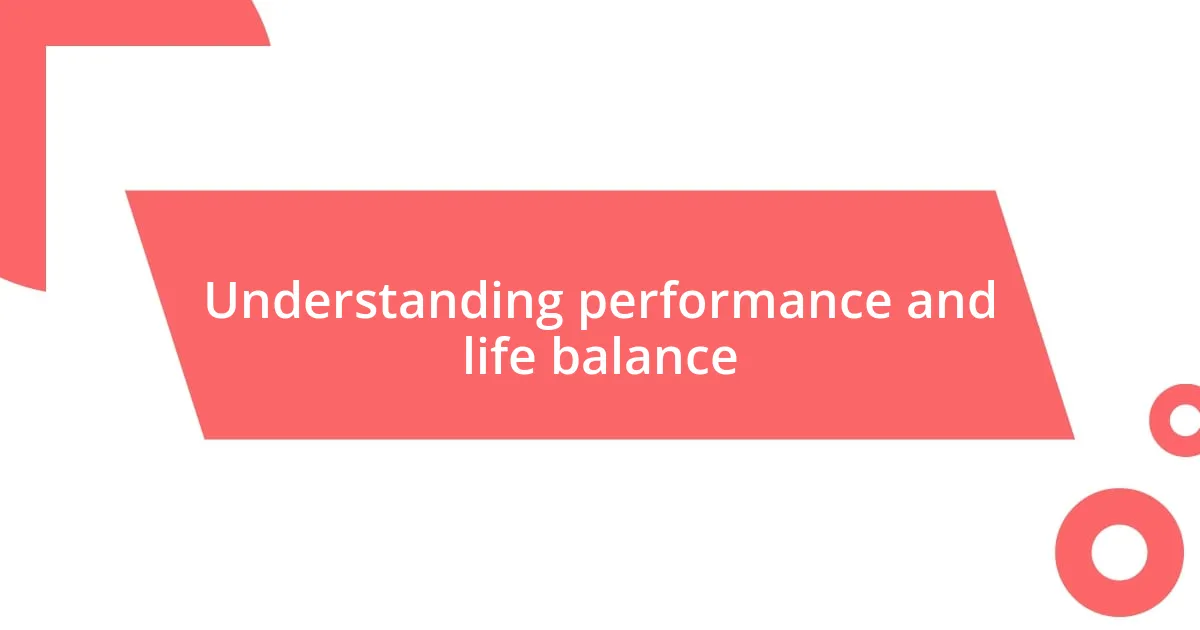
Understanding performance and life balance
Finding the right balance between performance and life can feel like walking a tightrope. I remember a time when I threw myself into work, thinking the extra hours would lead to better results. Instead, I found myself exhausted and irritable, questioning whether staying late was truly worth sacrificing time with friends and family.
Performance often demands focus and ambition, but what happens when our personal lives start to fray at the edges? In my experience, I’ve learned that neglecting self-care and relationships can undermine my performance in ways I never anticipated. Have you ever pushed through a tough week at work only to realize you’ve missed out on your child’s soccer game or a loved one’s birthday? Those moments have taught me that life isn’t just about achieving goals but also about cherishing connections.
Striking this balance is an ongoing journey. There’s a sense of freedom in recognizing that pursuing excellence doesn’t mean sacrificing personal joy. I often ask myself, “What does success really mean to me?” It’s not just the accolades or promotions, but rather, a fulfilled life that includes laughter, relaxation, and meaningful interactions. Reassessing this question periodically helps align my performance with what truly matters.

Identifying key performance areas
Identifying key performance areas can feel overwhelming, especially when you’re already juggling various responsibilities. From my experience, it’s essential to distill your goals into clear, manageable categories. For instance, I often categorize performance areas like work accomplishments, personal growth, relationships, and health. By focusing on specific domains, I can create targeted strategies that help me improve without compromising my overall well-being.
When I first attempted to identify my key performance areas, I used a simple exercise: I made a list of all my responsibilities and aspirations. This brought clarity and helped me see which areas needed more attention. I realized I had been neglecting my physical health while prioritizing work-related tasks. It’s funny how we often equate hustle with success, isn’t it? But recognizing that my health directly impacted my performance was a revelation, prompting me to integrate fitness into my routine.
Now, I often reflect on my progress in these key performance areas through a weekly check-in. I ask myself questions like, “Have I invested in my relationships this week?” or “Did I take time for my mental health?” This practice has not only helped me track my performance but has also enriched my life by ensuring that I’m nurturing all aspects of my being. It’s about creating a holistic approach that allows for both success and fulfillment.
| Key Performance Area | Focus Example |
|---|---|
| Work Accomplishments | Project deadlines and career growth |
| Personal Growth | Skills development and hobbies |
| Relationships | Quality time with family and friends |
| Health | Exercise routines and mental wellness |
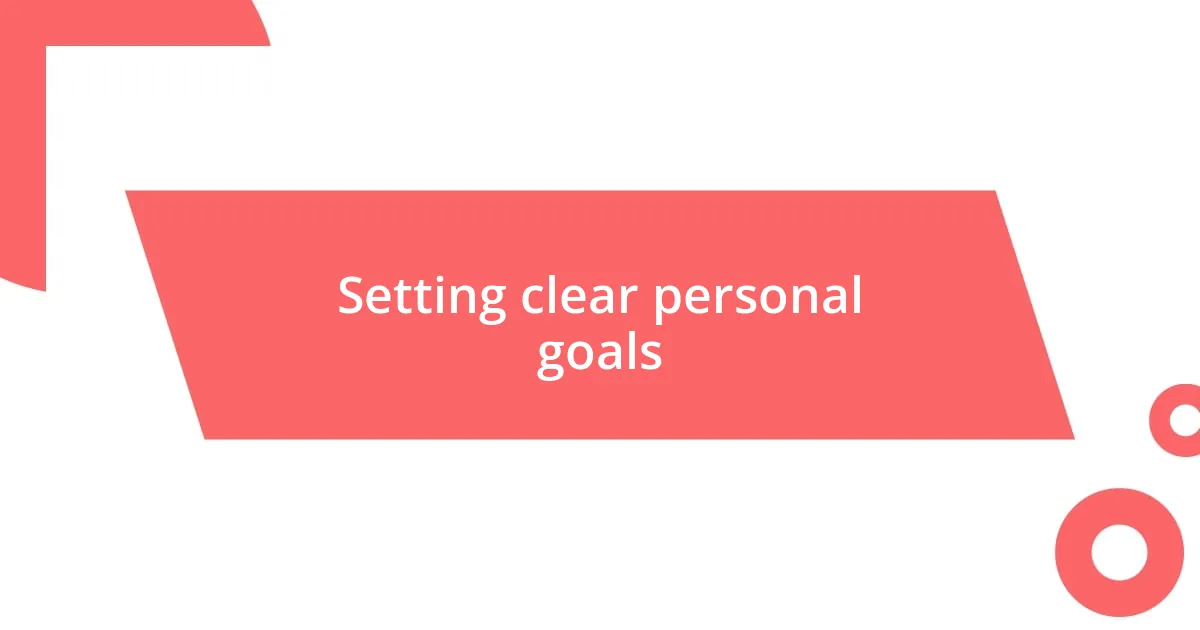
Setting clear personal goals
Setting clear personal goals has been a transformative practice for me, and it might just be the key for you as well. In my journey, I discovered that merely wishing for balance wasn’t enough; I needed concrete goals that resonated with my passions and aspirations. For example, I once set a goal of spending more weekends with family instead of catching up on work. This simple decision shifted my priorities and brought immense joy back into my life.
To effectively set personal goals, consider this approach:
- Identify your core values: Reflect on what genuinely matters to you—be it family, career, creativity, or health.
- Use the SMART criteria: Ensure your goals are Specific, Measurable, Achievable, Relevant, and Time-bound. For instance, instead of saying, “I want to exercise more,” say, “I will jog for 30 minutes three times a week.”
- Visualize success: Picture yourself achieving your goals. I often imagine how fulfilled I’d feel at significant life events, fueling my motivation.
- Write it down: Putting a plan in writing brings clarity. I keep a journal where I outline my goals and track progress, making adjustments as needed.
By structuring my goals in this way, I’ve noticed that the path to fulfillment feels less like a chore and more like an exciting journey. Each milestone I hit enhances my performance while deepening my connection to life’s pleasures!
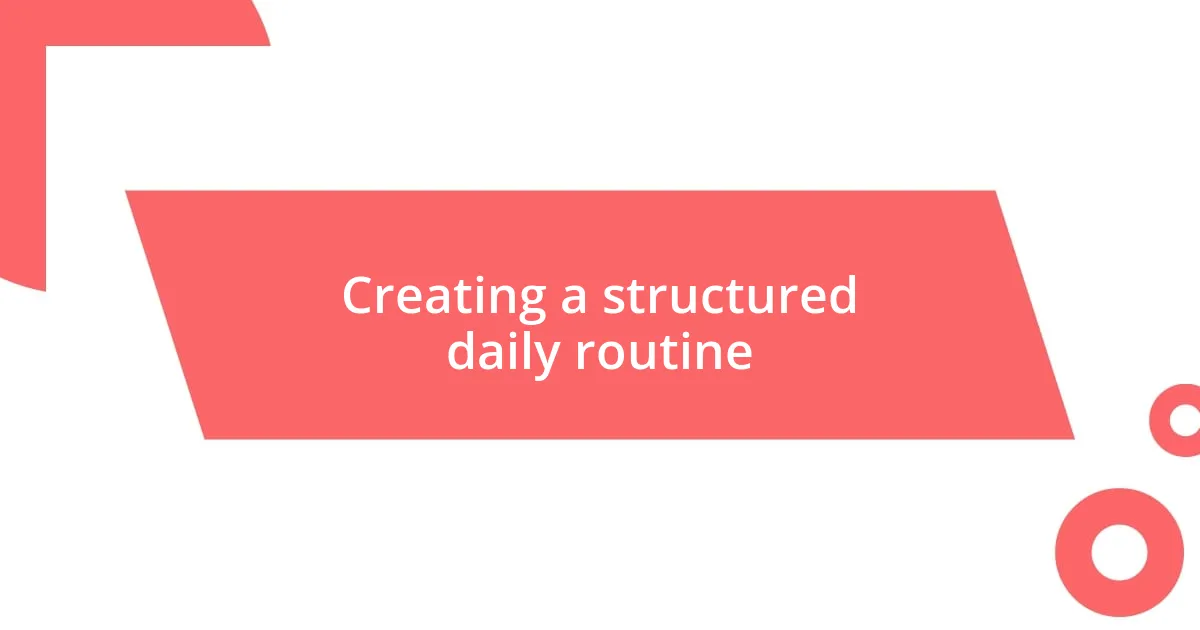
Creating a structured daily routine
Creating a structured daily routine has been a game-changer for me. I remember the chaotic mornings where I’d leap from one task to another without a clear plan. Now, I kick off each day with a simple morning checklist that prioritizes my most important tasks. This routine not only sets a positive tone but also minimizes decision fatigue—something I know so many people struggle with.
One practical strategy that worked for me is time blocking. I allocate specific chunks of my day for different activities, like work projects, workouts, and even downtime. It’s fascinating how, when I dedicate a solid hour to deep work, I often accomplish what used to take me all day. Does this sound familiar? If you’ve ever felt overwhelmed by endless tasks, time blocking may just be the remedy you need.
In curating my routine, I also learned to weave in self-care moments. For instance, I’ve made it a point to step outside for a brisk walk during lunch breaks. This small decision not only re-energizes me but also allows my mind to reset. It’s incredible how a few minutes of fresh air can ignite creativity and boost productivity. Have you found little routines that transform your day? I’d love to hear about them!
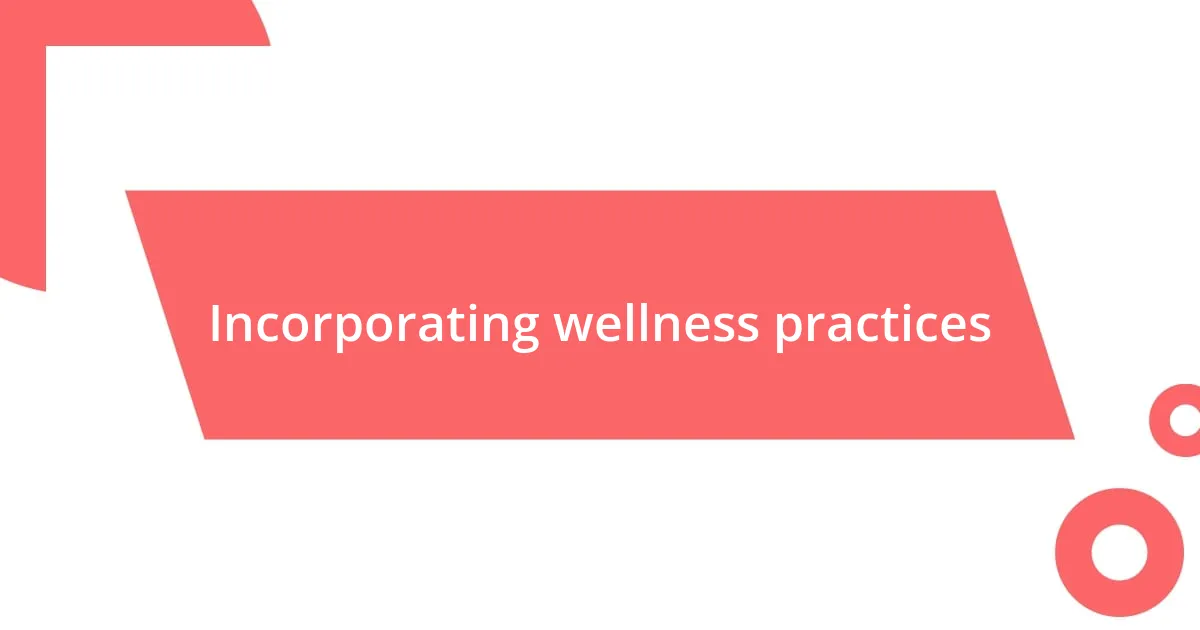
Incorporating wellness practices
Incorporating wellness practices into my life has dramatically influenced my overall well-being. I remember a particularly stressful week at work when everything felt overwhelming. In the midst of that chaos, I decided to begin each day with a short meditation session. Just five minutes of deep breathing and focusing on the present worked wonders, grounding me and enhancing my focus throughout the day. Have you ever tried meditation? It’s remarkable how such a simple practice can create a ripple effect in your daily life.
Exercise is another crucial wellness practice I’ve integrated. Gone are the days when I thought I had to run marathons to stay fit. Instead, I discovered the joy in yoga and dancing—activities that not only make me feel good but also boost my mood. I vividly remember attending a local dance class and feeling my stress melt away, replaced by laughter and connection with others. Have you ever experienced a physical activity that instantly lifted your spirits? Engaging in movement that you love can transform your approach to health.
Furthermore, prioritizing sleep has proven essential for my performance and overall happiness. There was a time when I would burn the midnight oil, believing it made me more productive. Now, I ensure I get a solid seven to eight hours each night. I even created a calming bedtime ritual, which includes reading a few pages of a good book. The change in my energy levels and focus has been astonishing. Have you considered how improving your sleep quality might enhance your life? Embracing these wellness practices has not only helped me maintain performance but also shaped a more fulfilling life.
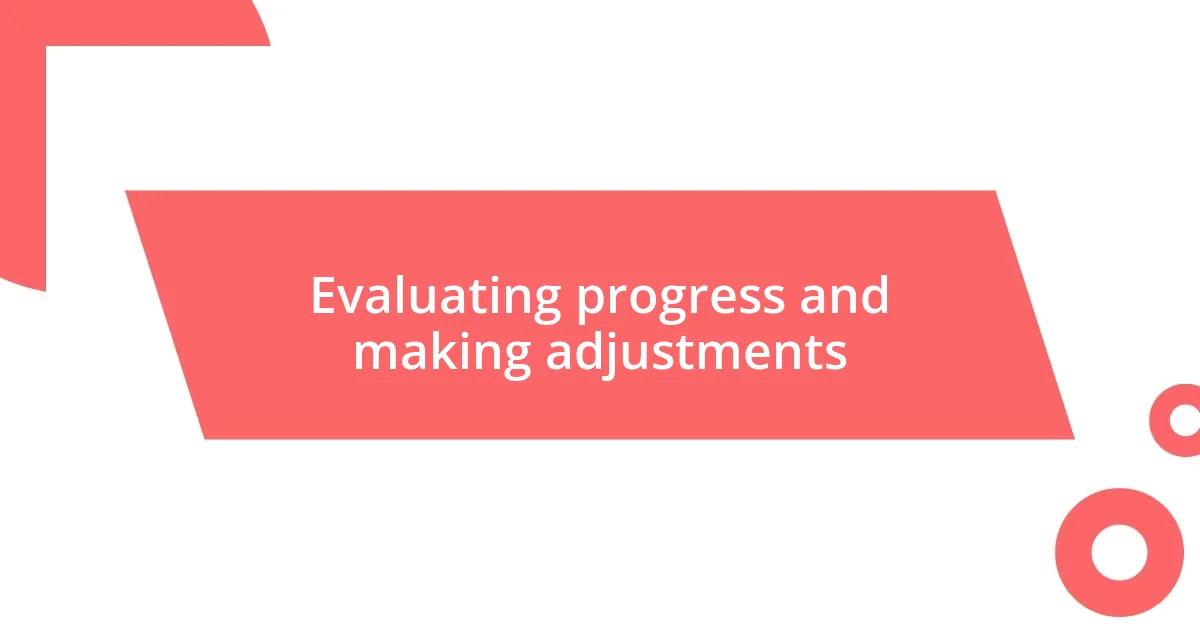
Evaluating progress and making adjustments
I’ve found that regularly evaluating my progress is crucial for both my performance and personal life. For instance, at the end of each week, I sit down with a cup of tea and reflect on what worked and what didn’t. It’s often during these moments of introspection that I discover small adjustments I can make, whether it’s shifting my work hours or reprioritizing tasks. Have you ever taken the time to review your week? It can be enlightening.
Sometimes, I realize I’ve become too focused on one area, and making a quick adjustment can restore balance. A little while back, I was so engrossed in a work project that I had neglected my social life. After reflecting on my week, I decided to schedule regular catch-ups with friends. That simple change recharged my energy and creativity, reminding me of the importance of connection. What adjustments have you made to keep your life balanced?
Another practical tip I’ve adopted is tracking my goals and progress visually. I created a colorful chart to track both my professional milestones and personal endeavors. Every time I achieve a goal, I get to fill in a space with vibrant markers—it adds a fun element to the process. Have you ever thought about making your progress visually appealing? I find that this not only keeps me motivated but also helps me prioritize the necessary tweaks in my approach, ensuring I’m continuously growing in all areas of my life.













